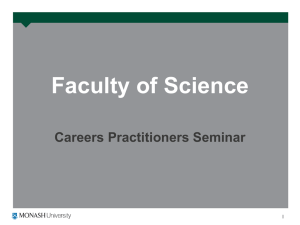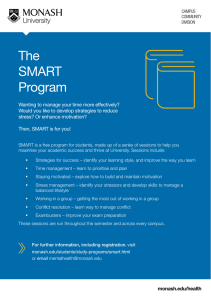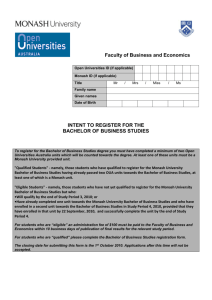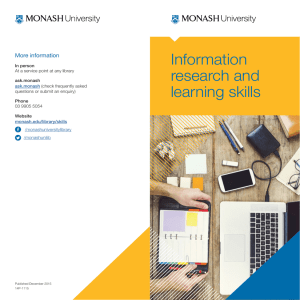MONASH SCIENCE UNDERGRADUATE COURSE GUIDE 2017
advertisement
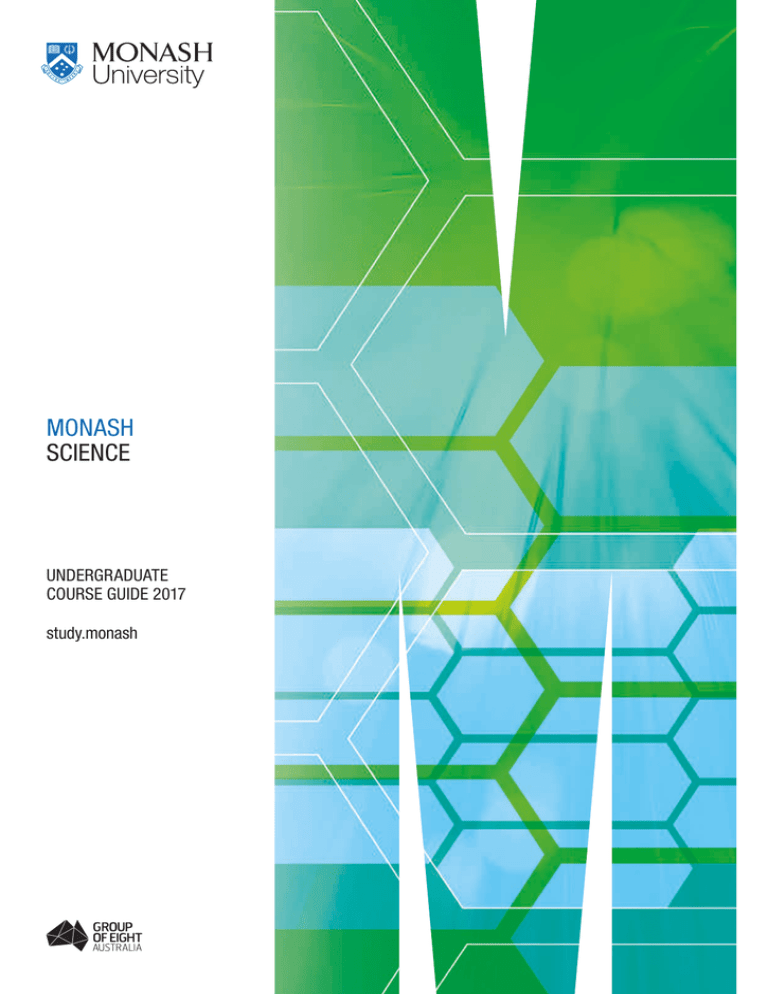
MONASH SCIENCE UNDERGRADUATE COURSE GUIDE 2017 study.monash “The future needs fast movers and big ideas. Above all, it needs people who can grasp a complex problem and build the solution required – with talent, creativity and flair”. Professor Ian Chubb AC, Australia’s Chief Scientist We are facing a wide range of complex challenges – environmental pressure, climate change, booming population and an ever-changing technological, economic and social landscape. These challenges bring with them exciting opportunities – to innovate, collaborate, and create solutions that will change the world. That’s where you come in. With a degree in science from Monash University you could influence government policy on waterways management, be out in 1 the field searching for fossils in Antarctica, work on manufacturing the bionic eye or develop a ground breaking new vaccine. Or, you could take your scientific expertise into business, the not-for-profit sector, teaching or communications, to name just a few. There has never been a better time to study science. If you want to make a difference, do what you love, and use your science training and knowledge to influence our future, Monash Science is the place for you. WHY SCIENCE AT MONASH Australia’s best science facilities Do what you love from day one Our state-of-the-art science precinct is home to two student lounges just for science students, along with many other comfortable break-out spaces for studying and hanging out. We’ve spent millions in recent years on making our student facilities and buildings among Australia’s best. Our science degree offers genuine flexibility and choice. Along side your science studies you can take subjects from other areas such as Arts, or do all science if that is what you want. Fancy mixing physics with theatre? You can at Monash. We also offer double degree options, allowing you to study towards two degrees at the same time. A double degree course takes two years less to complete than studying towards the two degrees separately. We also take a unique approach to teaching. For example, you’ll study geology by actually getting your hands dirty in our brand new outdoor classroom – the Field Experience Rock Garden. If biology is your thing, our amazing on-campus outdoor reserve allows you to study the natural world in the great outdoors. Physics students benefit from an innovative group approach to learning that throws traditional lectures out of the window, developing skills in team-working, problem-solving and leadership. You have the flexibility to build your course around your love of science, and not be forced into breadth areas outside science. We also recognise your passion for science by offering those of you studying more than one science subject through years 11 and 12 a VTAC subject bonus. This could improve your ranking and eligibility into the Bachelor of Science. The world is your classroom Get hands-on and learn from the world’s best Real-world skills and experience The world is your classroom when you study science with us. 25 of the units we offer take you from the classroom out into the field – from Heron Island’s pristine coral cays, the jungles of Borneo, to the rocky outcrops of the Cinque Terre in Italy. We’re not all theory; you’ll get plenty of hands-on lab hours. You’ll be learning from academics who are pioneering international research in their scientific disciplines. Our undergraduate students are actively encouraged to participate in research projects and some of our students have been published in leading scientific journals, and accompanied their teachers on expeditions to exotic places such as Antarctica and Africa. We also offer double the lab hours compared to some universities, meaning there are more opportunities to get hands-on. You’ll be given lots of coaching and guidance to prepare you for the world after university, from learning leadership skills to writing your CV. We have an in-house careers consultant, alongside leadership and mentoring programs to hone your non-academic skills and help prepare you for your dream job. You can also complete industry placements while you study. We have a proven track record of providing a springboard to a huge range of careers and postgraduate research in science and beyond. Our students have assisted senior staff with research into topics as diverse as natural resource exploration in Tanzania, fossicking for fossils in Antarctica and developing solutions to water purity using graphene. 2 OUR COURSES At a glance For students looking to begin study in 2017 BACHELOR OF SCIENCE ATAR 85.00* 2016 Clearly-in ATAR Subject prerequisites English Maths Science/Other BACHELOR OF SCIENCE ADVANCED – Global Challenges (Honours) BACHELOR OF SCIENCE ADVANCED – Research (Honours) ATAR (Range of critea including): ATAR information form. 90.00* Supplementary If successfully shortlisted based 95.00* on the supplementary form, you will be invited for interview N/A Location(s): On-campus at Clayton Duration: 3 years (full-time) 6 years (part-time) Start date: First Semester (February) Second Semester (July) Bachelor of Science If you want to make a difference, studying a science degree at Monash will give you the opportunity to learn from leading experts whose cuttingedge research is influencing the world’s future. The choice, flexibility and depth across the huge range of science disciplines available at Monash means that you will graduate with a degree unique to you, tailored to your individual expertise, interests and career aspirations. The comprehensive range of majors, extended majors and minors on offer provides you with a broad education and allows you to explore varied interests before focusing in the one or two areas that most inspire you. However, if a particular field has always captivated you, you can choose it from the start. DID YOU KNOW? If you are studying more than one eligible science subject in Year 12, you will qualify for subject bonus. This could improve your ranking and eligibility into the course. 3 Subject prerequisites English Maths Science/Other Subject prerequisites Course details Qualifications: 2016 Clearly-in ATAR English Maths Science/Other Course details N/A Course details Location(s): On-campus at Clayton Duration: 4 years (full-time) Start date: First Semester (February) Qualifications: Bachelor of Science Advanced – Global Challenges (Honours) This is a science degree with a difference – the only course of its kind in Australia. In addition to studying the science discipline of your choice under the watchful eyes of some of the world’s leading scientists and academics, you will receive high-level training in leadership, persuasive communication, entrepreneurship, policy, ethics and corporate and social responsibility. You will graduate with Honours from the Bachelor of Science Advanced – Global Challenges (Honours) and will leave university equipped with a rich and diverse set of skills, a strong peer and mentor network and the passion and confidence to pursue a meaningful, exciting career. Location(s): On-campus at Clayton Duration: 4 years (full-time) Start date: First Semester (February) Second Semester (July) Qualifications: Bachelor of Science Advanced – Research (Honours) Do you see yourself making a difference in the world through the advancement of scientific research? If so, this is the course for you. As a scientist, you will play an important role in developing cutting-edge technologies, therapies and initiatives that address some of the greatest challenges to society. You may be instrumental in policy making, research and teaching, addressing issues associated with health care and social well-being. You may also be employed in traditional and emerging areas where expertise in life sciences, chemistry, geosciences, mathematics and statistics, computer sciences and the physical sciences is important. *Australian domestic students Visit study.monash to view entry requirements and to read more about our courses Double degrees If you have a passion for an area outside of science, or would like to go into a field in which scientific knowledge would be an advantage, a double degree could be the perfect choice for you. Combining science with another area of specialisation gives you a unique suite of skills and helps you stand out in today’s competitive job market. Double degrees with Science: Double degrees allow you to study two separate degrees at the same time. The way they are structured enables you to graduate with both degrees in a much shorter time than it would take to complete the two degrees individually. ■■ Bachelor of Science and Bachelor of Arts ■■ Bachelor of Science and Bachelor of Biomedical Science ■■ Bachelor of Science and Bachelor of Computer Science ■■ Bachelor of Science and Bachelor of Global Studies ■■ Bachelor of Science and Bachelor of Music ■■ Bachelor of Commerce and Bachelor of Science ■■ Bachelor of Commerce Specialist and Bachelor of Science ■■ Bachelor of Engineering (Honours) and Bachelor of Science ■■ Bachelor of Information Technology and Bachelor of Science ■■ Bachelor of Laws (Honours) and Bachelor of Science ■■ Bachelor of Education (Honours) and Bachelor of Science To find out more about double degrees, including how they work and why you should do one, visit study.monash/courses SAMPLE COURSE MAP This is an example of what your studies as a science student could look like (single degree). As a Bachelor of Science student you will have the option to take electives, allowing you to choose subjects outside of science, or extra science subjects, depending on your interests. YEAR 1 YEAR 2 YEAR 3 Semester 1 Science major Science Maths or statistics Elective Semester 2 Science major Science Science elective Elective Semester 1 Science major Science Science Communication Elective Semester 2 Science major Science Science Elective Semester 1 Science major Science major Elective Elective Semester 2 Science major Science major Elective Elective 4 WHERE YOUR FIRST YEAR STUDY CAN TAKE YOU In each of our three courses you can choose from seven areas of study in your first year. These areas of study can lead you to 26 possible majors. A major is a study area that you choose to focus on as a primary part of your degree and can lead to a variety of career outcomes. This table outlines the many areas of study you can undertake in Science at Monash and where they could lead you. Read more about our majors at study.monash/courses WHAT YOU STUDY IN FIRST YEAR EXAMPLE CAREERS Biochemistry Developmental biology Ecology and conservation biology Environmental science (extended major) Genetics Human pathology Immunology Microbiology Pharmacology Physiology Plant sciences Zoology Agricultural Researcher Animal Technician Bioinformatician Biotechnologist Biotechnology Product Developer Botanist/Plant Scientist Clinical Scientist Cytogeneticist Ecologist Entomologist Environmental/Conservation Biologist Environmental Consultant Environmental Health Promoter Evolution and Adaptation Biologist Fauna Assessment Officer Geneticist Hospital Scientist Laboratory Research Technician Marine/Freshwater Biologist Medical Researcher Microbiologist Museum Curator Park Ranger Patent Officer Research Scientist Science Journalist Science Teacher Soil Scientist University Lecturer Wildlife Manager Zoologist CHEMISTRY Biochemistry Chemistry Materials science Physiology Agrochemicals Chemist Analytical Chemist Biomedical Chemist/Analytical Chemist Biotechnologist Biotechnology Sales and Marketing Manager Drug Development Chemist Environmental/Water Chemist Explosives Chemist Food Technologist Forensic Scientist Hospital or Medical Laboratory Technician Industrial Chemist Instrument Specialist Molecular Design Chemist Occupational Health and Safety Officer Occupational Hygienist Paint Chemist Pharmaceutical and Product Manufacturer Pharmaceutical Representative Polymer Chemist/Materials Scientist Process Control Specialist Quality Controller Research Chemist Risk-Management Consultant Science Journalist Teacher Toxicologist Waste and Resources Management Consultant Water Quality and Management Consultant Winemaker EARTH, ATMOSPHERE AND ENVIRONMENT Geographical science Earth science Environmental science (extended major) Atmospheric science Atmospheric Scientist Ecotourism Operator Environmental Geoscientist Environmental Scientist Geochemist (Analytical Laboratories) Geological Survey Scientist Geologist (Mineral/Petroleum Exploration) Geophysicist Geotechnical Engineer Government Adviser (Environmental Policy and Management) Hydrogeologist Land Use Planner Landcare Project Manager Marine Biologist Marine Geoscientist Metallurgist Museum Scientist Natural Resource Manager Palaeontologist Park Ranger Research Geologist Research Geophysicist BIOLOGY 5 MAJOR WHAT YOU STUDY IN FIRST YEAR MAJOR EXAMPLE CAREERS MATHEMATICS MATHEMATICS Applied mathematics Financial and insurance mathematics (extended major) Mathematics Mathematical statistics Pure mathematics Atmospheric Scientist Biostatistician/Data Analyst Business Analyst Computational Mathematician Computer Software Developer Data Mining Analyst Environmental Resource Modeller Financial Consultant Investment/Business Analyst Market Statistician Mathematical Modeller Mathematics Teacher Meteorologist Oceanographer Programmer Quantitative Analyst Statistician PHYSICS Astrophysics Materials science Physics Physiology Accelerator Physicist Acoustics Scientist Applied Physicist Astronomer and Astrophysicist Atmospheric Physicist Biophysicist Electron Microscopist Energy Consultant Forensic Physicist Industrial Physicist Instrumentation Physicist Materials Scientist Medical Physicist Nuclear Physicist Optical Physicist Optical Systems Specialist Patent Attorney Physics Teacher Synchrotron Scientist Telecommunications Specialist University Lecturer INFORMATION TECHNOLOGY Computational science Business Analyst Business Operations Coordinator Consultant Business Systems Analyst Graduate Project Manager IT Analyst IT Consultant IT Domain Specialist IT Support Project Manager Software Consultant Software Developer Software Test Analyst Strategic Analyst Technology Consultant Web Developer PSYCHOLOGY Psychology Career Counselling Child Psychology Clinical Neuropsychology Clinical Psychology Counselling Psychology Educational and Developmental Psychology Forensic Psychology Health Psychology Management Organisational Psychology Sport Psychology Teaching 6 GETTING INVOLVED AND GETTING HELP University can be so much more than going to lectures, labs and tutes. You can find your niche by joining one of 150 plus student societies (there’s everything from the Monash Science Society to the Society for Anime and Manga Appreciation, to name a few). Or you can get involved with extra curricular programs available in science to boost your resume. You also need never feel on your own. There is always help available – from how to understand and structure your course, to study help and career support. We help you get the most out of your time at university. “I wish I could go back and tell myself that Science isn’t scary – there’s so much help and support at University when you find some aspects of coursework hard. You’re not alone.” Keisha Nash Bachelor of Science MEET MORE OF OUR SCIENCE STUDENTS AT monash.edu/science/future-students/meet-our-students 7 THERE’S ALWAYS HELP AVAILABLE GET MORE OUT OF YOUR UNI EXPERIENCE Science Student Services Dean’s Student Action Committee Science students have access to expert course advisors who can help you shape your course according to your interests, passions and career goals. We believe the student voice is important. Students can and should be able to shape their education. Dean’s Student Action Committee gives you the opportunity to represent the student voice to our senior managers. Being part of the committee gives you the opportunity to shape the Faculty’s future and influence decisions that affect students. Science Transition Program We have put together an online hub to help you make a smooth transition to uni. Each week when you log in you will see answers to frequently asked questions, tips on where to get lecture notes, how to access library materials, managing workload, preparing for exams and much more. Drop in study centres We offer drop in homework centres for all students where you will find free tutoring and academic support. If you need assistance with lecture, tutorial or laboratory class content, the tutors in the learning centres can help. Many of the tutors are also instructors in first year units so they have extensive knowledge of the unit, assignments and assessment tasks you need to complete. Tutors can also assist with developing study plans, providing tips on study techniques and showing you how to access the range of university support services available. Get a mentor The Science Peer Mentoring Program matches you with a senior science student who will help you get settled in and make new friends as you begin your studies. Science Student Ambassador Program Science Student Ambassadors play a key role in promoting Science programs and activities to future and current students. You will get hands-on experience with public speaking, social media management and events. Science Future Leaders Program This program is for passionate science students who want to take their leaderships skills to new heights. Activities undertaken during the year-long program will assist participants to develop a range of skills relevant to leadership in their studies and career. Activities include a camp, a series of leadership seminars and workshops, and the opportunity to practice leadership within the university, chosen profession, and/or wider community. For more information about our science-only experiences visit monash.edu/science/futurestudents/life-on-campus GET READY FOR THE REAL WORLD Science Industry Placement Program (SIPP) Unique to Monash Science, the Science Industry Placement Program (SIPP) gives you the opportunity to gain industry experience, develop leadership skills by working independently on a project with an industry partner and get your foot in the door of chosen career path. Our students complete placements at Zoos Victoria, CSIRO, Bureau of Meteorology, Murdoch Childrens Research Institute, OXFAM, AgriBio and many more. Career development and support As a science student at Monash you have exclusive access to a career consultant, who can provide advice and assistance on resume development, finding job opportunities, graduate employment programs and maximising your time at university to ensure you graduate ready to launch into your dream career. We also run an industry week annually where industry representatives come on campus to talk jobs and careers, job placement programs and people you can meet with for one-on-one career help. For more information about career development and support, visit monash.edu/science/currentstudents/industry-placementsand-career-support The 6-week program provides you with opportunities to meet like-minded fellow students in a social setting. From second year, you can also reciprocate your experience by becoming a mentor. For more information on Science’s help and support services, visit monash.edu/science/currentstudents/help-and-support @MONASHSCIENCE Follow us on Instagram to see what life on campus is really like. 8 USING SCIENCE AS A PATHWAY TO OTHER STUDY AREAS A Monash Bachelor of Science forms a strong foundation for students wanting to work towards further study in medical, pharmaceutical or psychology fields. Graduate Entry Bachelor of Pharmacy (Honours) 2 years (full-time) Complete a Bachelor of Science Graduate Entry Bachelor of Medicine and Bachelor of Surgery (Honours) 3 years (full-time) 4 years (full-time) Doctor of Veterinary Science Complete a Bachelor of Science 3 years (full-time) + Honours in Psychology 1 year (full-time) 9 Postgraduate study in Psychology – Master of Psychology 2 years (full-time) Pharmacist or employment within science – related role Medical Practitioner Veterinary Surgeon Psychologist PATHWAYS INTO SCIENCE Getting the ‘right’ ATAR isn’t the end of the world, there are alternative pathways into a Bachelor of Science at Monash. Monash University Foundation Year (International students only) TAFE qualifications (graded) Certificate IV Science-based certificate IV-level studies will be considered where the applicant has achieved average results of 80% or above. For applicants who have also completed VCE, both qualifications will be considered. No credit is granted for these studies. Diploma To be considered, applicants who have completed VCE or its equivalent and who are applying with a science-based diploma will require a minimum average result of at least 60%. Applicants who have not completed VCE but have completed a science based diploma will require a minimum average result of at least 70% Diploma of Higher Education (DoHE) Students completing Monash University Foundation Year can enter the Bachelor of Science at first year. Single university units Students can apply to study two single (science) university units. Upon completion and with a minimum result of 60%, application can be made for entry into the Bachelor of Science. Monash Extension (Year 12 students only) Monash Extension allows highachieving Year 12 students to try university before finishing school. Students complete a pair of firstyear university science subjects as part of their final-year school studies and receive credit for enrolling into a science course. Monash College (Diploma of Science) ■■ ATAR of at least 65, with a study score of at least 30 in English (EAL) or 25 in any other English. ■■ TAFE applicants can apply with a recognised Certificate IV – average grade of 70%, and a recognised Diploma – average grade of 60%. ■ Submission of online Supplementary form stating why the applicant wants to study at Monash. ■ Upon successful completion of all units and a minimum score of 60%, admission can be made into second year Bachelor of Science, and Bachelor of Science and Bachelor of Education (Hons). Upon completion of Year 12 Australian equivalent, students can undertake an eight-month Diploma of Science at Monash College which offers a direct pathway into the second year of a science degree. SCIENCE AT MONASH 10 Monash online monash.edu/science Find a course study.monash/courses International students monash.edu/study/international Scholarships monash.edu/scholarships Monash on Twitter @Monash_Science Monash on Instagram @monashscience Stay in touch with science Register at monash.edu/science/future-students/stay-in-touch Future student enquiries Australian citizens, permanent residents, and New Zealand citizens Tel: 1800 MONASH (666 274) Email: future@monash.edu monash.edu/study/contact International students Australia freecall tel: 1800 181 838 Tel: +61 3 9903 4788 (outside Australia) Email: study@monash.edu The information in this brochure was correct at the time of publications (April 2016). Monash University reserves the right to alter this information should the need arise. You should always check with the relevant Faculty office when considering a course. Designed and produced by SMC Monash: 16P-0130. CRICOS provider: Monash University 00008C, Monash College Pty Ltd 01857J
